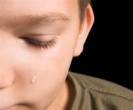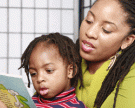A goldfish won at a fair is often a child’s first experience with having a pet. They a re excited and promise to take good care of their pet. However, in the excitement no one remembers that goldfish lives are rather short and so the day comes when “Goldie” is found swimming on top of the water. Adults who may find the goldfish first have a natural inclination to protect the child from the hurt and pain that comes with losing someone you love. They may rush out to a pet store and attempt to replace Goldie with another fish before the child notices.
re excited and promise to take good care of their pet. However, in the excitement no one remembers that goldfish lives are rather short and so the day comes when “Goldie” is found swimming on top of the water. Adults who may find the goldfish first have a natural inclination to protect the child from the hurt and pain that comes with losing someone you love. They may rush out to a pet store and attempt to replace Goldie with another fish before the child notices.
While this is natural and understandable it may not be the best course of action. By shielding a child from a natural process we deny the child the opportunity to experience and feel the loss, which will support them in coping with other, and more major, life losses in their lives.
So what should we do? It is best to share the experience with the child, honestly answering their questions and allowing them to express their feelings. An open discussion about death helps children understand that all living creatures die: animals, plants, and humans, too. Allowing them to express their feelings helps them to stay connected to their emotions and teaches them that appropriate expressions of sadness, anger, and  acceptance are normal and healthy.
acceptance are normal and healthy.
Exploring ways to celebrate “Goldie’s” life helps children appreciate that life is special and has purpose. Help the child decide how to memorialize their pet, respecting actions that are comfortable for the child. A small funeral, a special burial location, a short prayer, reading or memory sharing are all helpful activities that provides the child with a loving and supportive environment in which to grieve for their pet. Allowing the child the opportunity to decide if and when they are ready for another pet respects their healing process. 
The child may need to process this experience for days or weeks afterwards through questions and discussions. Be patient and honest in the discussions allowing the child to draw their own conclusions from the experience. In time, the discussion will stop but the experience will stay with the child forever. I am quite sure that everyone reading this article can reflect on a similar experience,  whether positive or not.
whether positive or not.
Reading stories of other children’s losses helps the child understand that they are not the only one with this experience. There is comfort in knowing that others understand.
About the Author
The Institute for Child Development and Family Relations would like to thank Victoria Stephan for allowing us to reprint her blog. Victoria is the Director of the Stephan Center. The Stephan Center is a service organization dedicated to those journeying through life losses. It provides education and resources to professionals and laypersons as support and understanding is given to those seeking peace and acceptance in their lives.
You can learn more about the Stephan center on their website at http://www.thestephancenter.org/
[…] “Goldie” The Goldfish Teaches Children About Life Losses Apr […]
I totally agree with how we shouldn’t shelter our kids with death and how natural it happens. Sometimes death is something that we can never judge or figure when it will occur. When we hide the reality of death from our kids it’s not necessarily helping but hurting them. When the time comes the kid wouldn’t be able to handle the situation and it might scare them or have some psychological effects.
I totally agree with how we shouldn’t shelter our kids with death and how natural it happens. Sometimes death is something that we can never judge or figure when it will occur. When we hide the reality of death from our kids it’s not necessary helping but hurting them. When the time comes the kid wouldn’t be able to handle the situation and it might scare them or have some psychological effects.
As a teacher and a Child Development major, I know and understand the importance of sharing these types of life experiences with the child. As mentioned in the article, as caregivers, the first thing we want to do when a child is confronted with a distressing and upsetting situation is to protect them from the pain that often accompanies these situations. The idea of a child hurting is often distressing and upsetting for us adults to witness. However, situations like these offer great opportunities to teach children how to handle these types of emotions. The only way children will be able to deal with these types of situations and emotions is through learning about them. Allowing the child to express their feelings and helping them label those feelings enables the child to learn about different emotions that are often experienced in a situation like this. It helps them learn that it is okay to have these different feelings and also helps them to understand those feelings. In addition, it also allows children to learn healthy coping mechanisms as the parent and/or teacher can help them come up with positive methods of grieving. Such emotions can often be overwhelming for the child to feel and deal with alone; therefore, guiding and supporting the child through this situation really helps them learn how to handle this situation in the future. It also enhances the bond between parent and child or teacher and child. I think the best thing we can do for our children is talk to them and educate them about these types of topics. Hiding them from the child is detrimental to their emotional and psychological health as they do not learn healthy methods of dealing with these type of emotions and often turn to less positive behaviors to express those emotions.
I completely agree with what this article talks about. I think that giving a child an opportunity to learn what loss feels like at such a young age, will eventually benefit them in the long run because they have already experienced it before. When they suffer from a loss in the future, of course it might be a bit more difficult depending on what the situation is, but the child will at least be aware that he/she may experience this heartache. They may also learn about different coping mechanisms that will help them deal with future losses.
Thanks for sharing the coping mechanisms of young children dealing with a death. Strangely enough, in my current class of Health and Wellness of Aging Adults, we discussed the processes the one goes through in the stages of grief. I think it was important to note that throughout these stages, allowing the child to appropriately respond, reflect, and openly discuss their feelings are also very important in the process. I mentioned my cousin’s younger kids in my other discussion thread, and I think this information will be helpful for them in order for their kids to have healthy methods of grieving.
I found this article to be such a great idea of teaching young children about grieving and about life in general. A time to grieve will inevitably happen along the child’s life and I think exposing them to an experience in childhood where they can learn coping skills, will encourage them to use those skills later on in life when they go through other losses. A process such as this one with “Goldie”, also validates their feelings of sadness and allows them the opportunity to cherish life and their loved ones even more. We automatically want to protect, young children especially, from feeling sad but I think it is even more important to go through a process such as death, together and exposing them to healthy ways of healing in sad/difficult times.
Naturally you would think to hide a young child room a death, due to them being too young and not able to understand. I totally agree with this article about talking to the child about what happened and answering their questions. I remember as a child we didn’t have those conversations when a pet died, I didn’t get to ask about death it was just something that just happened and something we had to deal with as a child. Now as i am older i able to see the disconnect when it comes to grieving, and I often wonder if as a child if i were taught to express my emotions towards death would I be more sensitive to it.
I completely agree with what this article talks about. I think that giving a child an opportunity to learn what loss feels like at such a young age, will eventually benefit them in the long run because they have already experienced it before. When they suffer from a loss in the future, of course it might be a bit more difficult depending on what the situation is, but the child will at least be aware that he/she may experience this heartache. They may also learn about different coping mechanisms that will help them deal with future losses.
This can definitely be “teaching moment” to help children cope with the lose of a loved one. In retrospect, I can remember a similar as a child. In elementary I had went away on a three week vacation with the family. Only to discover my pet turtle named Charlie had passed away. My cousin who was the caretaker of the turtle had explained how Charlie had gotten sick and just died a few days after caring for him. They had buried Charlie in their back yard and said their goodbye’s. As a child I felt a little incomplete and sad for missing the opportunity to say goodbye to him. Reading this article reminded me of the important lessons we can have a child. Lessons like these can prepare us to deal with losing someone/something very dear to us.
When I was younger I endured numerous losses of gold fish and even small red-eared sliders. I remember when I first got both gold fish and turtle, I felt super happy and protective over them. I would feed them three times a day, look over them and constantly touch them. As I reminisce about my past with these old pets of mine, I think about how annoying I was to them. One summer I went to science came and my mother was now in charge of my pets. Her duty as my replacement was to feed them and change out their tank. I was gone for two weeks, all I could think about was my pets, seeing that they were the only responsibilities I had at the age of ten. I came home from science came, and the first thing I did when I got home was check on my pets. I was so happy to finally be home and see how they were doing. I looked at the tank and realized that my gold fish was missing, and then I looked at my turtle and saw that it was not moving. What I then realized was that my turtle was dead. I figured since it looked like it was dried out, because there was no water in the tank. I was so upset because my mom was suppose to take care of them and she did not. She then told me gold fish died that is why it was not in the tank. From this experience I learned that it was definitely one of the hardest thing I had to face at that time. My mom told me that animals do not always make it till a hundred and that they have to go to heaven some day. When I was younger it was bizarre to hear that not everything lives forever. I manage to cope with the losses of my pets, but overall I learned that I am still able to move on and live my life. This goes for losses within family members, yes it is hard at first and it can take an emotional and mental toll on us, but what good does it do for us on our lifestyle if we became depressed by not learning how to cope with loss. We as individuals need to mentally and emotionally prepare for losses within our family because it is enviable. We have to learn how to look on the positive things in life even if they are some negative outcomes.
I believe it is extremely important for parents to let their children go through these life experiences without having to cover up to avoid them from pain. It is part of life and eventually we all grow up to see that everything has an end. They have to learn how to cope with it when they are little so when someone passes away, they know the concept of death, they might not understand it fully but they will have an idea of what it is. All we can really do is be there for them and let them express their emotions and comfort them.
As a social work major and an older sister to three younger brothers, I have seen how difficult it can be to talk about death to children. I have seen how children go from seeing a pet die to complementing and worrying about their parents and loved ones dying. It is a difficult topic to discuss but as the article explained as a caregiver we do not want the child to experience any sadness or distress but a child needs to learn from this experience. A child cannot be hidden from the reality of death, a child should be able to express their emotions and ask as many questions as they want on the question about death. It helps the children learn the different emotions they will experience and how to cope with them.
I agree, being open and honest with your child on the loss of a pet will help them to better understand the cycle of life and how to cope. It’s true that it is best not to shield your child since death is a natural process. This also helps them to express their feelings with their parents instead of repressing them.
Just as the article states I too believe that this is an important stage in a child’s life. The death of a fish should be viewed as a teachable moment, it is a way to expose children to death for the first time. It is important to show them that death is a natural process of life and not only happens in animals but people too! It is also important to alow kids to express themselves fully how ever they want and keep an open discussion about how they are feeling. This article was beautiful written.
As a student of sociology and Psychology I can understand the idea of teaching our children about loss but as a parent and grandparent I have to ask the question, WHY? Can’t we just let our children be children for a while without explaining death, If a child live’s in an area where death is common or in a family with a known disease then maybe this is an option but otherwise let kids live as kids. We seem to be wanting our children to grow up too fast these days, Is it that the world is a scary place and we want them to be prepared for it or is it a scary place because we are making it scary for them. I believe that childhood is not just about age, working with children has shown me that some children seem to be older than their age because of what they have experienced while others are still childlike. It is inevitable that we will experience loss but as parents one of our jobs is to shield our children from pain, not drag them to it. I know this is not the academic answer but I think it is the parental one.
I also believe is it very important for children to know this stage of life. Help children understand the cycle of life, the gold fish is a great teachable moment for them. My boyfriend was very sheltered as a child, he was confused how and why his grandmother had past away. His parents never talk to him about death and how to deal with it. He then began to feel scared and worried for his family thinking he was going to lose them or they will not be there that next morning. He lived with that feeling all through out his childhood. I feel that parents should talk to their children and help them with that processes. This will help children deal with their feelings and feel safe at home and with their family. I really enjoyed reading this article.